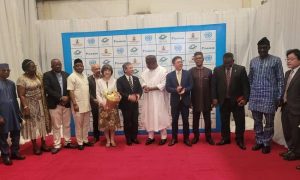Nigeria has begun the implementation of Hydrochlorofluocarbons Phase-out Management Plan (HPMP) project to completely phase out its 2010 baseline consumption of 344.9 Tonnes of HCFC by 2040.

Dr. Iziaq Adekunle Salako, the Minister of State, Federal Minister of Environment, made this submission in his keynote address delivered at the official commissioning of the ozone and climate-friendly air conditioning manufacturing line at Sacral Industries Limited in Lagos on Thursday, April 4, 2024.
The Minister said: “Nigeria is a party to the Montreal Protocol on Substances that Deplete the Ozone Layer, this is a multilateral environmental agreement that regulates the production and consumption of man-made chemicals referred to as Ozone Depleting Substances (ODS).
“Under the treaty, parties have specific responsibilities related to the phase-out of different groups of ODS. In September 2007, parties to the protocol decided to accelerate their phase out schedule for Hydrochlorofluorocarbons (HCFC) which are gases used worldwide in refrigeration, air conditioning and foam applications, being ozone-depleting substances and powerful greenhouse gases. Developing countries, including Nigeria, agreed to their phase-out process in 2013 and are now following a stepwise reduction until complete phase-out by 2040.”
Speaking further, Dr. Salako opined: “The project is being implemented in stages and, having completed stages 1 and 2 under the United Nations Industrial Development Organisation (UNIDO) component of the project, the Multilateral Fund of the Montreal Protocol approved stage 3, which we are currently implementing, focusing on the conversion of eligible companies in the refrigeration and air conditioning manufacturing sector from the use of HCFCs to ozone-friendly and low global warming potential alternatives such as Hydrocarbons, to help Nigeria meet its target of 67.5% reduction in HCFC baseline consumption by 2025.
“This project will assist Nigeria in its compliance with the Montreal Protocol provisions, thereby raising the country’s status among the Committee of Nations as a model of success in the implementation of the Montreal Protocol. The converted line will lead to the phase-out of 10.93 Metric Tonnes of HCFC-22, thereby contributing to the achievement of Nigeria’s 67.5% reduction target of HCFC baseline consumption by 2025.”
The Minister also reaffirmed the Ministry’s commitment to the implementation of the Montreal Protocol and its ODS phase-out programme and also reiterated that the government of President Bola Ahmed Tinubu, in line with his Renewed Hope Agenda and Skills Up Acquisition programme of promoting indigenous production, will put in place all necessary policies and enabling legislations that will sustain the phase-out of HCFC-22 in the refrigeration and air-conditioning manufacturing sector in Nigeria.
The Japanese Ambassador to Nigeria, Matsunaga Kazuyoshi, who highlighted the significance of Daikin Air Conditioners, noted that the product would directly tackle the pressing issue of climate change.
He said: “One of the priority issues at Tokyo International Conference on African Development (TICAD 9), a conference that we first hosted over 30 years ago aiming to tackle various issues that Africa faces along with African continent.
“The start of this production line in Nigeria serves as a hopeful sign expected to greatly contribute to Africa’s effort in combating climate change. We look forward to seeing positive effects it will bring to Nigeria and across the continent.”
Rajeev S. Girglani, Managing Director, Sacral Industries Limited, in his submission, noted that the launch of a new manufacturing line is a transition from environmental harmful gases to cleaner and greener future.
“It has been our goal all along to make sure that we are able to meet climate change challenges and achieve a green future which we all benefit from.
“Our 32-unit product, apart from being environmentally friendly, also consumes vastly low electricity in comparison to previous units,” he stressed.
Oluyomi Banjo, National Programme Coordinator, Energy and Environment for UNIDO, noted that their involvement in the project is in partnership with National Ozone Office of the Federal Ministry of Environment and it is geared towards upgrading and changing the technology of the air conditioners manufacturing line in Nigeria.
He stressed that manufacturing and assembly of the products can be done in Nigeria using new technologies that are globally accepted.
“This technology is environmentally safe with low ozone depleting potential and also low climate change potential with lots of potentials of creating additional jobs for Nigerians,” he declared.
By Ajibola Adedoye
